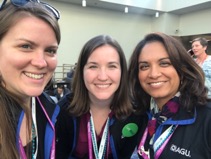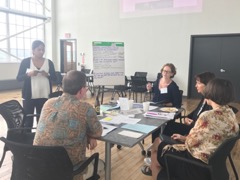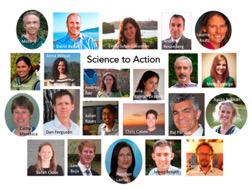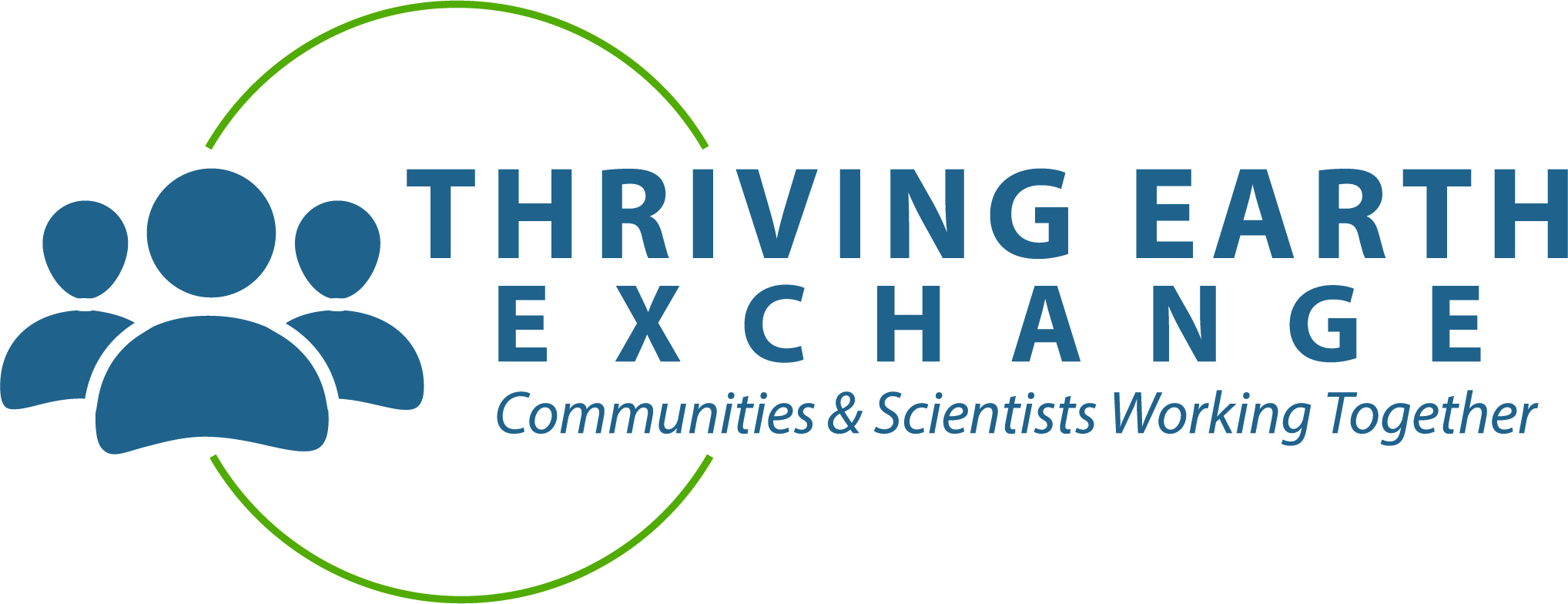The model of fostering productive partnerships between scientists and people who aren’t professional scientists—what we call community science—continues to gain traction in ways big and small. Scientists across many disciplines are demonstrating a commitment to making research relevant, accessible and usable. Communities are reaching beyond traditional boundaries to seek new sources of information, learn from each other and tackle vexing problems. By forming true partnerships, scientists and communities are discovering their power to catalyze creative solutions and reinvent how decisions are made.
Here at TEX, we are honored and humbled by the opportunity to spur community science forward by facilitating partnerships, guiding best practices, challenging assumptions, exchanging ideas and sharing what we’ve learned. To everyone who has sponsored, supported or participated in our work, we extend our heartfelt gratitude for your time, expertise and enthusiasm.

TEX staff members Sarah Wilkins, Melissa Goodwin and Natasha Udu-gama (from left) at the AGU Fall Meeting.
2017 was a big year for TEX and our incredible network of partners. Our work is being recognized in ever broader contexts, and we are proud to serve as a nexus for experiments and insights in community science. This year brought substantial expansions in our number of partnerships and projects, as well as the launch of new project models and cross-cutting programs. We were invited to share our insights on collaborative approaches with a range of audiences including early-career scientists, scientific leaders and adaptation practitioners. We were pleased to help advance diversity in research, improve science education and grow citizen science. In short, through our connections and initiatives TEX has helped galvanize a growing movement of scientists and communities interested in collaborative approaches.
We thought we’d take a moment to celebrate what we’ve accomplished together, and to preview the year ahead.
Projects
Projects to address specific, concrete community concerns are central to the value TEX provides. With years of practice under our belts, we’ve been able to learn from our experiences, refine our process and establish best practices for every stage of a collaboration, from selecting partners to sharing results. In 2017, we began experimenting with a peer-learning approach that groups projects together in order to facilitate cross-project exchange and improvement.
Completed in 2017

A project in Jackson, Wyo. focused on addressing sources of nutrient contamination in a local waterway.
We completed eight projects this year, addressing challenges from protecting local water resources to planning for heat waves to assessing climate vulnerabilities:
- Improving Greenhouse Gas Inventories in Pittsburgh, PA
- Improving Local Air Quality in Granite City, IL
- Evaluating Water Quality and Flood Risk in Kennedale, TX
- Protecting a Crucial Stream in Jackson, WY
- Restoring a Local Pond for Recreational Use in Berlin, MD
- Updating a Climate Vulnerability Assessment in Santa Cruz, CA
- Planning Heat Resilient Urban Design in Washington, DC
- Building Community Resilience to Extreme Heat in Brookline, MA
Launched in 2017
2017 saw the start of 20 projects on a range of topics including air quality, flooding and drinking water contamination. 2018 will be an exciting year for the communities participating in these projects:
- Interpreting Local Air Quality Data to Support Pollution Monitoring in Brandywine, Md.
- Addressing Bacterial Contamination in a Constructed Wetland in Ontario, Calif.
- Integrating Sea Level Rise, Riverine and Flood Models in Marin County, Calif.
- Designing a Makerspace to Support Innovation in Economic Diversity Opportunities in Farmington, N.M.
- Mapping Heat Vulnerability in Missoula, Mont.
- Monitoring Environmental Health Impacts of I-10 to Engage Residents and Decision Makers in New Orleans, La.
- Creating Community Through Neighborhood Environment Monitoring in New Orleans, La.
- Accounting Cumulative Impacts of Highly Industrialized Infrastructure in Robinson and Smith Townships, Pa.
- Identifying Contaminants in Drinking Water in Cambridge, Ohio
- Establishing a Low-Cost, Sustainable Environmental Monitoring Program in Barnesville, Ohio
- Updating a Climate Vulnerability Assessment in Santa Cruz, Calif.
- Remediating Groundwater Dioxane to Mitigate Marl Pond Degradation in Colebrook, N.H.
- Developing an Environmental Impact Monitoring Plan in Evanston, Ill.
- Gauging the Impact of Sea Level Rise on Wetlands in Hayward, Calif.
- Characterizing Industrial Air Toxins in Louisville, Ky.
- Recycling Food and Animal Waste for Social Good in Montego Bay, Jamaica
- Assessing Drought Risk and Vulnerability in Las Vegas, Nev.
- Balancing Sustainability Priorities with Development in an Urbanizing Watershed in Corinth, Texas
- Assessing Flooding and Hydrodynamics for Community Preparedness and Revitalization in De Soto, Mo.
- Assessing Flooding and Hydrodynamics for Community Revitalization in Sunset Hills, Mo.
- Assessing Flooding and Hydrodynamics for Community Revitalization in Connellsville, Pa.
- Assessing Flooding and Hydrodynamics for Flood Prevention and Mitigation in Ocean City, N.J.
- Assessing Flooding and Hydrodynamics for Flood Prevention and Mitigation in Virginia Beach, Va.
- Evaluating Green Infrastructure Solutions and Stormwater Controls to Mitigate Flooding in Radnor Township, Pa.
Programs
Multi-year, broad-based programs give us a chance to explore cross-cutting challenges in depth while building the knowledge and structures to support future initiatives.
Resilience Dialogues
TEX served as founding co-leader of Resilience Dialogues from 2016-2017. A cross-sector public-private coalition, Resilience Dialogues uses online tools and frameworks to foster collaboration between scientists and city leaders around risks related to climate variability and change.
The number of participating cities doubled in 2017 as the leadership team refined a structure and methodology to help communities contextualize climate resilience, find resources and identify action areas and next steps (methods highlighted in this Eos article; outcomes summarized in this project report). As the year drew to a close, TEX transferred co-leadership responsibilities to the American Society of Adaptation Professionals.
The program completed dialogues with 10 communities in 2017 and tackled challenges such as flooding and wildfire risk, improving public engagement and embedding resilience into policy:
- Antioch, CA
- Boynton Beach, FL
- Bridgeport, CT
- East Lansing, MI
- Hallandale Beach, FL
- Menominee Reservation
- Shasta, CA
- San Francisco Bay Conservation and Development Commission
- Savannah, GA
- Whitefish, MT
Adaptation Analytics
The Adaptation Analytics investigation grew out of a need, articulated by community leaders, to increase the accessibility and utility of geoscience data for adaptation decision making. Launched in 2017, the effort has a dual aim: to explore the usefulness of different climate change information presentations as decision support tools, and to work backward from user needs to develop an applied research, development and deployment agenda in localized geosciences forecasting and risk assessment.
By developing decision support tools in collaboration with users from public, private and community-based sectors, we hope to foster collaborative adaptation approaches while addressing on-the-ground needs. In the year ahead, the program proposes to uncover user needs through workshops, prototypes, and focus groups; define a development pathway for leveraging emergent Earth science models and data to support those needs; and articulate a geoscience research agenda based on those user needs.
Creating Connections
Connections—between experts and leaders, scientists and citizens, data and decisions—are at the heart of the TEX model. This year, we created connections by expanding our network of partners and staff; organizing, facilitating and presenting at numerous workshops; sharing best practices; and creating new ways for stakeholders to come together around problems, opportunities and solutions.
Expanding Our Network
In 2017, TEX formed working relationships with a number of new partners including Flood Forum USA, the National Council for Science and the Environment and The New Advisory Group. We look forward to exciting projects with these organizations in the year ahead!
TEX also welcomed new staff members Sarah Wilkins, Project Manager, and Shahan Haq, intern for Adaptation Analytics. We were also pleased to appoint Jenny Riker, University of Bristol, and Mike Burns, Environmental Protection Agency, to our Advisory Board.
Hitting the Road

Researchers and community members collaborated to plan several projects focused on communities with unconventional oil and gas development at a project launch workshop held in conjunction with GeoPolicy Connect.
We kick-started a number of our projects this year through in-person facilitated discussions in which experts and community members explored key challenges and made concrete plans to address them. These included a project launch workshop at GeoPolicy Connect focused on communities dealing with issues related to hydraulic fracturing, as well as a workshop, held as part of AGU’s Fall Meeting, to launch projects focused on indigenous communities in Louisiana and Alaska.
In addition, the TEX team took part in numerous national and international summits and conferences, including the 100 Resilient Cities Urban Resilience Summit and the AGU Fall Meeting in New Orleans. Here are some highlights:
- TEX Director Raj Pandya was a presenter and panelist at the Innovations in Building Resilient Communities Workshop and the Rocky Mountain Science Communication Conference, chaired the National Academies Committee on Designing Citizen Science to Support Science Learning, joined the board of Public Lab, and gave opening remarks at the AGU Workshop on Diversity and Inclusion.
- TEX Senior Specialist Natasha Udu-gama spoke on a panel discussion on community science at CARIUSA 2017 and gave a plenary talk at the Natural Hazards Center’s Annual Workshop.
- TEX team members also presented at the Annual Conference of the Council of Engineering and Scientific Society Executives, presented about Resilience Dialogues at the National Adaptation Forum and for the National Academies Committee to Advise the USGCRP, joined a roundtable on citizen science at the Citizen Science Association Annual Meeting, and gave a presentation on climate change at the Denver People’s Fair.
Sharing Best Practices
As scientifically minded people, we are driven to document everything and learn as we go. As such, we’ve made a concerted effort to synthesize and share our practices, processes and ground rules. Here are some examples:
- The TEX Statement on Integrity in Community Science outlines the principles we use to guide our community science work: mutual respect, mutual planning, data co-ownership, community benefit, inclusiveness and the imperative to ‘do no harm.’
- TEX developed Community Science 101: Practical Tips and Real-World Strategies for Engaging with Communities, an interactive workshop was designed to teach best practices for successful community projects.
- TEX Director Raj Pandya has reflected on difficult dilemmas in blog posts including “What is and isn’t science?,” “Science, Knowledge, and Power” and “Science and Privilege.”
- TEX team members published A Framework Applied Three Ways: Co-Developing and Implementing Community Science Solutions for Local Impact and Using Online Dialogues to Connect Local Leaders and Climate Experts: Methods, Feedback and Lessons Learned from the Resilience Dialogues.
- New features on our website include Project Impacts, a comprehensive view of every TEX project’s outputs and impacts, and Milestones, an open-source collection of documents reflecting our methodology made available for anyone to use and adapt as needed.
Facilitating Exchange
This year TEX launched Community Science Connect, a node of AGU’s new online networking platform AGU Connect. The online space offers participants a perfect platform to garner feedback, give or solicit advice, share stories and publicize new opportunities. If you haven’t already done so, join the community and take it for a spin!

TEX has actively engaged with Science to Action, a group of AGU scientists interested in facilitating connections between research and community action.
TEX has also been active in supporting Science to Action, a self-organized group of AGU scientists interested in facilitating connections between research and community action. The group’s goal is to help communities thrive by increasing science engagement to better confront concerns posed by extreme events, natural hazards, climate change and other challenges.
Supporting Our Workforce
TEX is proud to be a member of the leadership team of Earth Connections, a new program to develop a more diverse geoscience workforce that will be equipped to understand and improve the environmental resilience of their communities. Regionally based educational pathways, rooted in collaborative approaches to local issues, will support and guide promising students in their efforts to learn geoscience skills, use science to address local challenges and explore career paths.
Staying in Touch
One of the most direct and important connections we make each year is with you! If you haven’t already, please subscribe to our newsletter, follow us on Twitter and check out our blog to get the latest TEX updates as they happen! Here’s a sampling of the topics we covered in 2017 on our own blog and others’:
- Bringing Science to the Table: What is an Engaged Scientist?
- Communities and Experts Collaborate for Climate Resilience
- What Would I Do with an Earth Scientist?
- Forging Partnerships Beyond the ‘Village’
As you peruse our materials, you also might notice one other update: our new website design and logo! We believe the new look better represents our community, our mission and the needs of our users. We hope you agree.
Whether you’re sponsoring a project, volunteering your time, making change in your community or just cheering us on, thank you. We look forward to another productive year!


